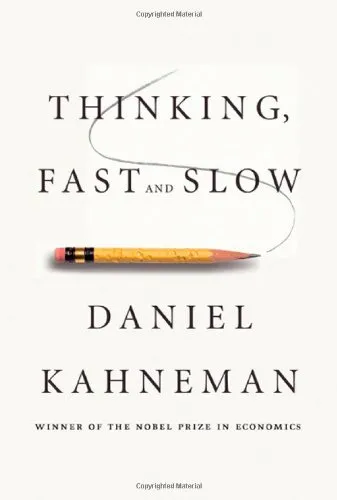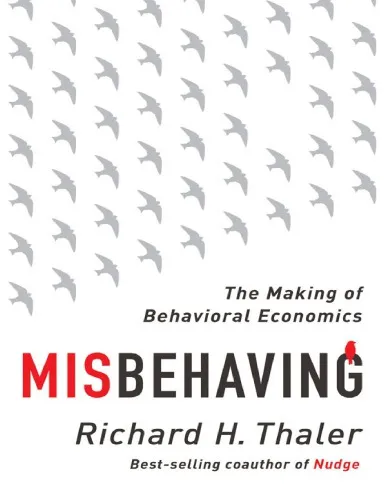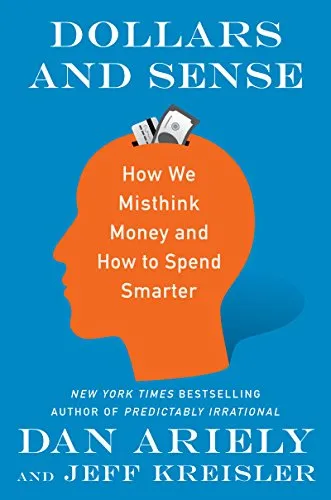The Psychology of Money and Public Finance
4.0
بر اساس نظر کاربران

شما میتونید سوالاتتون در باره کتاب رو از هوش مصنوعیش بعد از ورود بپرسید
هر دانلود یا پرسش از هوش مصنوعی 2 امتیاز لازم دارد، برای بدست آوردن امتیاز رایگان، به صفحه ی راهنمای امتیازات سر بزنید و یک سری کار ارزشمند انجام بدینکتاب های مرتبط:
کتاب "The Psychology of Money and Public Finance" یک اثر برجسته در حوزه روانشناسی اقتصادی است که به بررسی تاثیرات روانشناختی بر رفتارهای مالی و تصمیمگیریهای اقتصادی میپردازد. این اثر به فهم عمیقتری از اینکه چگونه احساسات و عقاید فردی میتواند بر اقتصاد عمومی تاثیر بگذارد، کمک میکند.
خلاصهای از کتاب
این کتاب در باب تاثیرات روانشناختی بر اقتصاد خرد و کلان مباحث جامعی ارائه میدهد. نویسنده با تلفیق دانش روانشناسی و اقتصاد، به تشریح رفتارهایی مانند پسانداز، مصرف، سرمایهگذاری و بدهی در سطح فردی و اجتماعی میپردازد. در بخشی از کتاب، تاثیرات اجتماعی و فرهنگی بر تصمیمگیریهای اقتصادی عمومی بررسی شده و مثالهایی از نحوه تغییر این تصمیمگیریها در طول تاریخ ارائه میشود. تقریباً تمامی جنبههای تاثیرگذار بر تصمیمات مالی افراد، از جمله انگیزهها، نگرانیها و الگوهای رفتاری، به طور جامع در این کتاب پوشش داده شده است.
نکات کلیدی
- درک اهمیت روانشناسی اقتصادی در تصمیمات مالی و اقتصادی.
- تاثیر حیاتی احساسات و ایدهآلهای فرهنگی بر اقتصاد عمومی.
- آموزش تغییر نگرشهای مالی برای بهبود تصمیمگیریهای اقتصادی.
جملات معروف از کتاب
"بسیاری از تصمیمات اقتصادی نیستند که محض بر اساس حساب و کتاب گرفته شوند، بلکه اغلب تحت تاثیر احساسات و تجربههای گذشته هستند."
"درک نادرست از رفتارهای مالی دیگران میتواند به نتایج اقتصادی غیرمنتظره منجر شود."
چرا این کتاب مهم است
این کتاب به دلیل رویکرد بینرشتهای خود، درک بهتری از پیچیدگیهای رفتارهای مالی ارائه میدهد. تاکید بر اهمیت جنبه روانشناختی در تصمیمگیری اقتصادی، میتواند به اقتصاددانان، سیاستگذاران و افرادی که به دنبال بهبود مهارتهای مالی خود هستند، کمک شایانی کند. این کتاب بهویژه برای کسانی که در زمینه اقتصاد رفتاری و سیاستگذاری عمومی فعالیت میکنند، بسیار ارزشمند است. به وسیله نگاهی تازه و علمی به مقولههای متداول اقتصادی، "The Psychology of Money and Public Finance" یکی از منابع حیاتی در جهت درک عمیقتر رفتارهای مالی و تدوین سیاستهای عمومی مبتنی بر ملاحظات روانشناختی به شمار میآید.
Introduction
Welcome to the intriguing world of 'The Psychology of Money and Public Finance'. In this enlightening book, Günter Schmölders delves deep into the intricate relationship between psychological principles and economic behavior. This book is an exploration of how emotional and cognitive factors influence financial decision-making on both personal and public scales. By understanding these principles, readers can better comprehend the motives behind economic policies and personal finance choices.
Detailed Summary of the Book
'The Psychology of Money and Public Finance' begins by examining the fundamental psychological elements that shape our attitudes toward money. Schmölders introduces the concept of economic behavior as inherently psychological, dismissing the notion that it is purely rational. The first chapters lay a foundation by discussing behavioral finance, introducing key psychological concepts like heuristics, biases, and risk perception.
As the book progresses, Schmölders connects these psychological concepts to public finance. He explores how governments and institutions are influenced by similar psychological principles. The book discusses topics such as fiscal psychology, the impact of public perception on policy-making, and the role of trust in public finance. By drawing these connections, Schmölders provides a comprehensive look at the fluid dynamics between individual psychology and broader economic policies.
The latter parts of the book focus on the implications of this relationship. Here, Schmölders discusses real-world case studies, illustrating how psychological factors can lead to financial upheaval or success. By presenting these examples, readers are encouraged to critically analyze current and historical financial events through a psychological lens.
Key Takeaways
- Psychological factors are integral to understanding economic behavior, both at a personal and a public level.
- Personal financial decisions are often driven by emotions and cognitive biases rather than pure logic.
- Public finance policies are influenced by public perception and psychological trust, affecting economic stability and effectiveness.
- An understanding of fiscal psychology can lead to better policy-making and financial strategies.
Famous Quotes from the Book
"Economics without psychology is like a bridge without foundation—it cannot stand the test of real-world stress."
"The true nature of finance cannot be understood without first understanding the minds that shape it."
"Public finance is less about the figures and more about the people; it is a reflection of human nature at a grand scale."
Why This Book Matters
'The Psychology of Money and Public Finance' is an essential read for anyone interested in the fields of economics, finance, or psychology. It provides an innovative perspective, encouraging readers to look beyond traditional theories and consider the human elements that drive economic systems. By dissecting the psychological underpinnings of money and finance, Schmölders gives readers tools to understand and navigate the complexities of financial systems more effectively.
This book matters because it bridges the gap between psychology and economics, offering insights that are crucial for policymakers, financial professionals, and anyone interested in improving their financial literacy. In a world constantly shaped by economic forces, understanding the psychological aspects of finance is more relevant than ever.
دانلود رایگان مستقیم
شما میتونید سوالاتتون در باره کتاب رو از هوش مصنوعیش بعد از ورود بپرسید
دسترسی به کتابها از طریق پلتفرمهای قانونی و کتابخانههای عمومی نه تنها از حقوق نویسندگان و ناشران حمایت میکند، بلکه به پایداری فرهنگ کتابخوانی نیز کمک میرساند. پیش از دانلود، لحظهای به بررسی این گزینهها فکر کنید.
این کتاب رو در پلتفرم های دیگه ببینید
WorldCat به شما کمک میکنه تا کتاب ها رو در کتابخانه های سراسر دنیا پیدا کنید
امتیازها، نظرات تخصصی و صحبت ها درباره کتاب را در Goodreads ببینید
کتابهای کمیاب یا دست دوم را در AbeBooks پیدا کنید و بخرید
1627
بازدید4.0
امتیاز0
نظر98%
رضایتنظرات:
4.0
بر اساس 0 نظر کاربران
Questions & Answers
Ask questions about this book or help others by answering
No questions yet. Be the first to ask!












